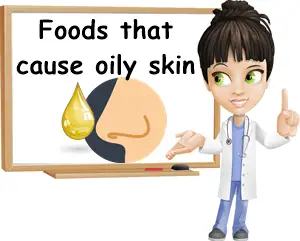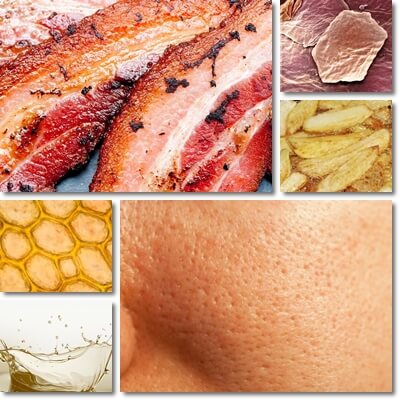If you have oily skin, then eating cucumber, bananas and drinking coconut water won’t help. While it’s true that we are what we eat, some things are genetically predetermined and can’t be “fixed” by our diet. You can’t simply “fix” your skin type with food, just like you can’t change the shape of your nose or your body shape or the texture, thickness or color of your hair with what you eat. And honestly, you don’t need to and shouldn’t want to either.
What food can do is help improve skin health and contribute to overall health in general. If you have an oily skin type, eating certain foods in particular will not make your pores shrink, your skin stop producing sebum altogether or your T-zone stop shining once and for all.
You’ll read all kinds of articles online about how cucumbers, bananas, coconut water and all of these other foods do this and that and completely change some aspect of who you are, like your skin type. You just don’t change something so fundamental such as your skin type by including a few foods in your diet. Not as drastically as it’s made to sound at least. You can however improve some aspects such as excess sebum production or maybe even frequency and severity of acne breakouts (if they’re not hormonal, for example) by eating a cleaner diet and leading a cleaner lifestyle overall. But that’s about it. If you have an oily skin type, no food is going to change that about it.

Can you stop oily skin with diet?
There’s no such thing. You don’t “stop” oily skin with diet. Oily skin is a normal type of skin. Other normal skin types are dry skin (lacking moisture and the plump associated with it, flaky, dull), normal skin (neither particularly dry, nor particularly oily) and combination skin (oily and dry, oily and normal). You can maybe improve an unbalanced oily skin type and reduce excess sebum production with a better, cleaner diet, if said unbalance is caused by dietary choices in the first place.
But for the most part, oily skin is hereditary, and associated breakouts often have an underlying hormonal cause, whether it’s genetics or disease or both.
Find out more about oily skin causes. A natural predisposition towards excess sebum production and hormonal imbalances paired with an improper skincare regimen often lead to acne breakouts, not the type of skin itself. Sebum can clog pores and cause bacteria to get caught in them, resulting in acne in the absence of a more or less rigorous skincare routine.
Underlying hormonal issues, whether normal hormonal fluctuations owed to age or pregnancy or hormonal fluctuations caused by disease or stress, contribute to acne breakouts by stimulating the production of certain hormones such as growth hormones or by stimulating the production of excess sebum, for example.
Is there a diet plan for oily skin?
If you have oily skin, and also frequent acne breakouts, you might be wondering what you can do about it, more exactly, what you can eat for a better, less oily skin. Well, there aren’t any foods that can help change your skin type from oily to normal. You’ll have to get to a point where you enjoy good general health, have a rigorous skincare routine adapted to your skin needs and eat a clean diet (because there’s no good health without a clean diet). And, should the need arise, resort to therapies especially designed for any of the skin issues you may be dealing with.
This being said, regardless of your skin type, there should be emphasis on healthy, clean eating. With this in mind, here are some foods, or better said, types of foods that promote good skin health and good health in general and some foods that are best not consumed too frequently, or at all.

Foods to eat more of for healthy skin (oily or not)
Fresh fruits and vegetables
Ideally, they should be locally grown, in season and organic. Eating fresh fruits and vegetables helps enrich gut microbiota. It’s been made clear by now that our gut is like a second nervous system so it stands to reason there should be great emphasis on eating clean and eating foods as close as possible to their natural state. So fruits and vegetables and byproducts such as cold-pressed extravirgin olive oil (see other olive oil types).
Not to mention they are packed with antioxidants, antioxidant vitamins and other components that actively support skin health.
For example, vitamin C stimulates the production of collagen which accounts for skin structure and elasticity and wards off early wrinkles.
Rose hips, guava, bell peppers, sea-buckthorn, kiwifruit and kale are good sources. Vitamin E in olive oil helps skin retain moisture for a plump and nourished appearance. At the same time, vitamin E counteracts excess sebum production by protecting skin cell membranes from oxidation and damage and helping cells retain moisture (sebum production can occur as a protective mechanism in oily skin types that are not properly moisturized and hydrated).
Clean meat
While there seems to be more benefits if diets are predominantly vegetarian, meat is still a source of important benefits for our skin and overall health and an integral part of a healthy diet when consumed reasonably. There’s vitamin B12 in meat as well as important amounts of most other B vitamins (B1, B2, B3, B5, B6, B9, choline), not to mention complete protein with all the essential amino acids.
B vitamins contribute directly to skin health and help prevent dry, cracked skin as well as support reparative skin processes that are vital for healthy skin. As for proteins, in addition to being present in skin cells, thus required in the diet, the amino acids they are made of are needed for cellular repair, hormonal and immune system responses, all of which benefit skin health directly and indirectly.
Meat is further a source of both good fat (e.g. DHA Omega-3) and bad fat (e.g. saturated fats). Vitamins that are important for skin health, such as vitamins A and E, need fat to be digested, absorbed and used by the body.
Fat is needed by hormones and is physically part of cell membranes. You really can’t have good skin without fat. Eating clean meat such as chicken, turkey, beef or pork, but also fish should not impact skin health in a negative effect, when consumed in moderate amounts, as part of an otherwise varied, balanced and clean diet.
To be healthy, it should be as close as possible to its natural state – no additives, no preservatives, no added flavors, food coloring, no pre-preparation, just meat.
Eggs and dairy milk
The two foods that nobody eats anymore. Despite criticism, eggs and dairy milk in their natural forms do bring important benefits in terms of nutrition, including benefits for the brain and nervous system, immune system, endocrine system, heart, muscles, bones and skin. Eggs and dairy milk are modest sources of Omega-3 and great sources of most B vitamins, as well as protein, fat-soluble vitamins and dietary minerals. All of these nutrients contribute to skin health directly by providing it with the nutrition it requires, as well as indirectly through regulatory mechanisms that help balance skin health. The secret is to consume them in moderation, as part of a healthy, balanced, clean and varied diet.
Foods to avoid for Oily Skin
Eating certain foods is a form of skin care and self-care. And so is avoiding others. This being said, there really aren’t foods that expressly cause oily skin or make your face oily if you eat them. If your skin type is oily to begin with, it will stay oily no matter if you eat cucumbers and drink coconut water or stop eating dairy, meat or spices. Rigorous skincare regimens can make an oily skin more manageable and sometimes also help prevent related acne breakouts.
If you’re looking on advice on how to prevent oily skin and avoid an excessively oily face (not change your skin type completely), take a look at my article on how to have less oily skin and find out my personal, tried-and-tested tips for a less oily skin.
This being said, there are some foods that are best avoided or at least eaten more infrequently if you are looking to enjoy better skin health and better health in general.
- Unhealthy processed foods (e.g. cake mixes, candy, margarine, salami, pate, processed cheese, carbonated beverages, energy drinks etc.).
- Junk food and fast food (e.g. chips, pizza, hamburgers, pies, hard candy, biscuits, muffins, pastry, anything in a box or package really).
- Pre-cooked and ready-to-eat meals and frozen dinners which tend to have too many calories, too much fat, too much saturated fat, too much salt, too much of everything.
- Any food product or meal with preservatives, flavor additives, synthetic colors etc.
- Greasy, oily, fried foods eaten too frequently.
For good health, meals should be prepared from scratch and be made from foods closest to their natural state as possible. For example, you can make a great pasta sauce from ground meat, tomatoes, salt, pepper and olive oil. Or a nutritious risotto with brown rice, peas, spinach and some olive oil and salt. Or a risotto with mushrooms or pumpkin cubes and chicken legs, olive oil and salt. Or have tuna with corn and beans. Or an omelette with eggs and vegetables such as onions, cherry tomatoes, greens such as spinach, kale, patience dock, nettle etc.)
Conclusion
If you are the proud owner of an oily skin type, know there’s nothing you can do in terms of diet to change your skin type. A rigorous and personalized skincare regimen is all you need to reduce excess sebum production and have a normally oily skin that is generally manageable. There are no foods that prevent oily skin or foods that expressly cause oily skin. But it helps your skin to eat healthy and clean which is why it’s important to focus on foods that are as close to their natural state as possible and consider a preponderantly vegetarian diet to get as much anti-inflammatory and antioxidant components as you can.
As a general rule when it comes to natural food and a clean diet, if you can’t identify the ingredients on the ingredients list in a food product you’re buying without a quick search on the Internet or, worse, a degree, then it’s probably not that okay to eat said food product all the time, too frequently or even at all. Not just for your skin, but for your health in general. Ideally, you should also have the option to trace your food and know how it was farmed to get a better idea of what exactly you are eating.

